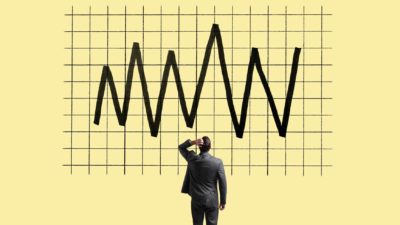I read an interesting sentence in an article in the Financial Review recently that, I think, tells us both a lot about ourselves, but also about how we can become better investors.
Specifically, it was a couple of statistics that surprised me when I read them. Quoting a Goldman Sachs research report:
"Since late October, S&P 500 has surged by 15 per cent and Russell 2000 has soared by 23 per cent…"
The S&P 500 Index (SP: .INX) is the premier US shares index, incorporating 500 of the largest US-listed companies. The Russell 2000 is the most-quoted US small-companies index.
While I knew shares had been rising recently, I didn't realise they'd gained that much in such a small amount of time.
The average stock market gain is somewhere close to 9% per annum. To make between 1.7-times and 2.5-times that much – in 6 or 7 weeks – is both notable and impressive. (And that's just in share price gains. The 9% annual figure includes dividends!)
And, if you're wondering, the ASX's largest index, the 500-company S&P/ASX All Ordinaries Index (ASX: XAO), is up 10% over that same time period, again excluding dividends.
Now, those numbers should tell us a few things.
First, as I say regularly, the share market is volatile. These sorts of moves aren't that unusual.
Second, as the old saw goes 'they don't ring a bell at the bottom'. There was no shotgun start, and no announcement before shares started to surge, a little under two months ago.
Third, you didn't have to do anything to benefit from these gains, other than let the market carry you higher.
But fourth – and this is the kicker – you had to be invested during that time.
I've lost count of the number of times people have told me, with some certainty, what was going to happen on the stock market tomorrow, or next week, or next year.
The accuracy of those certain predictions has been… underwhelming.
And inversely proportional to the certainty with which they've been proffered!
Now, these people aren't idiots. They've looked around at economic circumstances, share prices, market movements and lots more, besides, and triangulated all of that data to make a prediction.
Which – too often – has been simply…
How do I say this? Ah, yes, that's it…
Wrong.
Why?
Because, as the great Yogi Berra famously said, predictions are hard… especially about the future.
Now my message isn't that you should listen to my predictions rather than their predictions.
Mostly because I don't make predictions. And the reason? If I did, they'd likely be just as wrong.
But, worse, they'd probably induce me to take action. And those actions would probably cost me serious money.
The ASX is up 10%, even though:
– GDP growth, at 0.2% for the last quarter, is anaemic.
– Unemployment has risen to 3.9%
– Retail sales, in every single category bar food, have fallen
– Inflation remains high, at almost 5%
Now, people reading this will fall into one of two camps.
The first group will read that and think 'Well, obviously the market is mad. How can shares possibly rise in that environment. I'm going to sell!'.
The second group will read that and think 'The market knows all of those things, and it's still rising, because either it was originally too pessimistic and the data is better than feared' or 'The market is a forward-looking mechanism, and investors are already focussed on the coming recovery'.
Can I encourage you to take neither view?
See, in both cases, we're being tempted to observe some short-term historical data, to try to ascribe meaning to it, and to use those assumptions – plus some of our own predictions – to decide what to do next.
In short, we'd be succumbing to our egos – to want to believe we can find meaning, and to believe we can use our predictive powers to make money from that belief.
If I have gained anything during my decades as both a professional and amateur investor, it is the wisdom of knowing what I don't know.
(Cue the old joke about being proud of being humble!)
I have taken to heart Warren Buffett's comments about the size of his 'too hard' pile.
Some things are just unknowable. And the ability to accept that, despite a fervent wish for the opposite, is very important for investors.
My portfolio has gained nicely since late October. So have the scorecards of the services I run at The Motley Fool.
Many people in my position would be tempted to tell you they saw it coming.
So let me be very different.
I. Had. No. Idea.
If that makes you uncomfortable – particularly if you're a member of any of my services – then, well, good.
Because if you thought I had some supernatural predictive powers, I want to disabuse you of that notion.
I have two things going for me.
I have a good temperament for investing. And I am pretty good at understanding businesses and business models.
But I can't predict the future for nuts. So I don't try.
Why did my portfolio and my scorecards do so well since October?
Because I remained fully-invested.
I believe that, over the long term, capitalism – though flawed – will continue to deliver, both for society and investors.
I believe that, over the short term, sentiment – fear and greed – will shove share prices around. But in the long term, I believe that (and the data pretty nicely bears this out) business value will drive share prices.
So, I believe that share prices will march higher over time. I think it will be a long-term tailwind.
I could try to speculate as to the daily, weekly or yearly strength and direction of that wind, of course. I might even be lucky enough to be out of the market when the tailwind becomes a headwind.
But I might also be caught with my sails down and the spinnaker tucked away when a strong wind would otherwise push me forward, at a great rate of knots.
Okay, enough of the tortured analogy.
All the average investor had to do, over the past 6 or 7 weeks, was be invested.
Or, you could have tried to time the market. And maybe you might have been right. Or maybe not.
Which of those two strategies do you think is likely to be most effective, over the long term?
I absolutely understand the desire to know the future. And I understand the ego that tells us that we're smart, and capable, and can find some secret way to beat everyone else. (It's what those day-trading ads rely on!)
But I also understand that, for almost all of us, success comes not from harnessing those desires, but from suppressing them.
If success in any field comes from identifying the factors that are most likely to lead to the outcomes we seek, then repeatedly doing those things – and I think it does! – then investing history would suggest that remaining invested, and adding regularly would be at the top of that list if you want to grow your portfolio.
Speaking of predictions, I don't know if history will continue to repeat. But I do know that betting against it has historically been a very bad choice.
Or, as US fund manager Peter Lynch famously said: "I'm always fully invested. It's a great feeling to be caught with your pants up."
I hope you've enjoyed that feeling, recently. And I hope you'll continue to be caught with your pants up for years to come!
Fool on!









